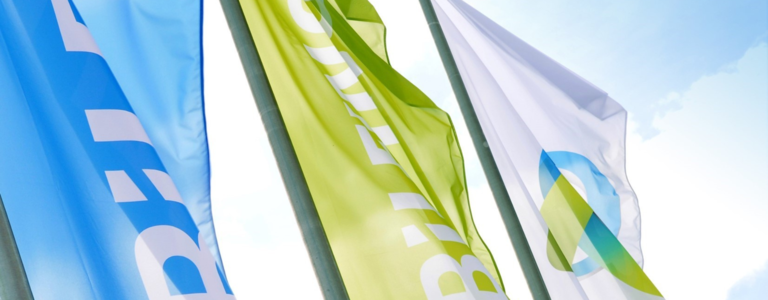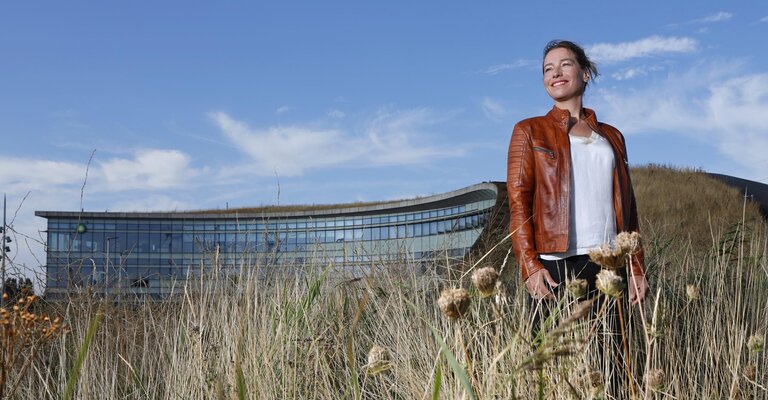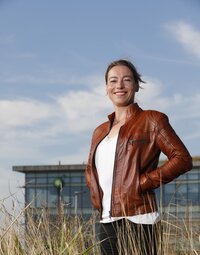
Bilfinger Magazine

Karen de Lathouder, CEO BP Netherlands: 'I want to lead and accelerate the energy transition'
Troubled times in the energy market are not stopping Karen de Lathouder from pushing ahead with BP's sustainability plans. I didn't invent the fossil industry, and we are dealing with a collective addiction to fossil plastics and fuels. But I can make sure that our production becomes carbon neutral and I am going to do that. By 2035 we will be there.
It is quite possible that in the long run petroleum will no longer be processed here at all, but, for example, synthetic fuels or a product we do not even know about yet."
The interview with Karen de Lathouder, the new CEO of BP Nederland, takes place in turbulent times in the energy market, by which she is not, however, thrown off guard.
'It is certainly a big problem that the energy market is completely out of balance. This situation is new to everyone, including BP,' says Karen. 'There is a huge imbalance in supply and demand of gas and oil because of the war in Ukraine. We have to get rid of Russian gas and we too are already consuming 40 percent less than before the invasion. For a number of companies, the price of gas is almost unaffordable and that means the Dutch economy is being hit. In addition, the oil price also fluctuates a lot and with it the profits of companies in refining. We will all really have to save gas next winter; both companies and people at home. I don't think there will be a gas shortage in the Netherlands any time soon, but the price is going to be very high.' That puts BP in what Karen calls: a trilemma. 'BP is responsible for a stable and reliable energy supply, an affordable energy supply as well as making the energy supply more sustainable. The relationship between these three elements was already difficult and it has now become even more difficult. Still, we continue to work on sustainability, and the fact that the coal-fired power plants are currently going back on, means for us as a sector that we have to reduce even more CO2 emissions even faster.'
Addiction to fossil
That the entire industry must become more sustainable more quickly, by the way, is a conviction Karen has held and propagated for some time. 'Industry is very important for the Netherlands. But not as it is now, with far too many CO2 emissions. At the same time, precisely because we emit far too much CO2, we can make an enormous contribution to achieving the climate goals. That's why I think this is where you have to start with CO2 reduction. I sometimes say, if I as CEO of BP don't do it, who will? In that respect, you don't have to convince me. Look, I didn't invent the fossil industry and our collective addiction to fossil plastics and fuels, that's what we're all stuck with. But I can make sure that our production becomes CO2 neutral and that is what I am going to do. In 2035 that will be the case.
Refinery conversion
That year was not chosen at random, because you need quite a bit of time for such a project. Karen: "2035 is the day after tomorrow for us as an industry. Large projects are not built in a year. It takes years, including design and permits, before anything is built. For us, energy transition means that we are converting our refinery into an integrated energy hub. By this we mean that we are going to integrate all kinds of energy. This will enable us to achieve our mission: to supply the world with energy at the lowest possible carbon footprint; and to lead and accelerate the energy transition. Anno 2022, we put crude oil in the refinery and diesel comes out; later we will put in green electrons via green electricity, or green molecules from green hydrogen, and clean and renewable energy comes out. It is quite possible that in the long run no more petroleum will be processed here at all, but, for example, synthetic fuels or a product we don't even know about yet.'
Blue hydrogen
One of the projects with which BP is already working to reduce CO2 emissions is H-vision. In fact, this project consists of two hydrogen plants producing blue hydrogen mainly from refinery gases from the refineries in the Rotterdam port area. 'There will be one at BP and one at Shell,' says Karen. 'The captured residual gases from our refining are transported by pipeline to a plant where they are used to turn them into low-carbon hydrogen by splitting it into CO2 and hydrogen. This hydrogen then goes back to the refinery and is used as a fuel to generate high-temperature heat. The CO2 created during the production of the hydrogen is immediately captured and then transported to empty gas fields under the North Sea for storage. Of course, we have to adapt our installation and pipelines.' Still, Karen counts the project as more or less low-hanging fruit. 'And that's where you have to start sustainability, I think.'
Green hydrogen plant
In the step after H-vision (using blue hydrogen), BP Netherlands is going ahead with green hydrogen. 'That may still be considerably more expensive now, but for that we have already set up the H2-Fifty project in cooperation with HyCC,' says Karen. 'That is a huge green hydrogen plant via electrolysis, at the newly to be built electrolysis park on the Second Maasvlakte. To gather enough green electricity, we recently made a bid for two lots in the offshore wind farm Hollandse Kust West. And a third major project is the construction of a unit for SAF: Sustainable Aviation Fuel, here at our Rotterdam site.'
Making a difference
The transition to an "integrated energy hub" is very much alive on the BP site, Karen says. Certainly among our employees. At first there were reservations and also some concerns: is there still a future for an oil refinery? Now that we've made the decision to build this integrated energy hub, you see that people think it's cool to be part of it. I also have some young engineers here from TU Delft who are really working here to make a difference. I'm in the same position myself, and I'm optimistic about it. Rotterdam is the perfect place for this transition. We have a seaport, we are an important energy port, we have empty fields for CO2 storage, we are a strong industrial cluster with innovation power, we have space, and we have smart people!
Role model
As for the people factor, there is some concern. It is no longer news that there is a shortage of technical workers. But the personnel shortage is expanding. Even the government, for example, has insufficient capacity to handle the necessary permit applications. Karen: "If I submit a permit application now, I may join the back of the queue and it will be my turn in two years. There are really too few people and that slows down the transition. Not to mention the shortage of technical people to build all those installations and soon run the new plant. That's why we need to tackle the image surrounding the industry, because I think that's the big problem that keeps people, especially girls, from choosing a technical education and a career in the industry. We really need to work harder on our image, because diversity is sorely lacking in our industry. I would like to see a reflection of society here at my refinery as well. I try to contribute to that by, for example, telling school classes about my work, and I try to be a role model for girls within the ‘Spiegelbeeld’ program of expertise center VHTO. But I am under no illusion that I can solve the image problem on my own.'
Karen de Lathouder
Karen de Lathouder studied Technical Chemistry at TU Delft, where she obtained her doctorate in 2006 on the subject of industrial catalysis. Karen then worked for Shell; including at the Pernis refinery but also offshore, for NAM. She then chose a role as director of an AkzoNobel salt plant in Denmark and later worked for AkzoNobel worldwide. She then found a new challenge in Oman, where Karen became site manager for Orpic. 'Once I was in Oman on vacation, saw that refinery and thought: that's where I want to work. So when they called me three years later, I immediately said yes. It was a special time; the people are nice and tolerant and no one looks up at full-time working women.' In 2017, she continued her career at BP, first in Hull, England ("a wonderful place"), then in Gelsenkirchen, Germany. In 2021, she became VP refining of the Rotterdam refinery and as of Jan. 1, 2022, she is CEO of BP Netherlands.

